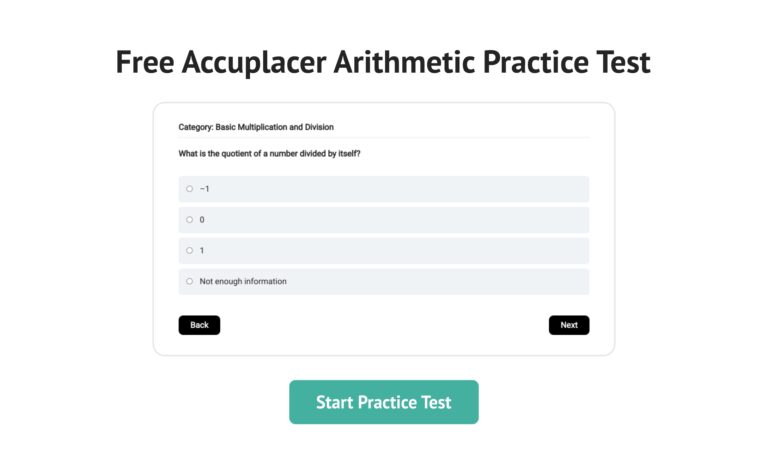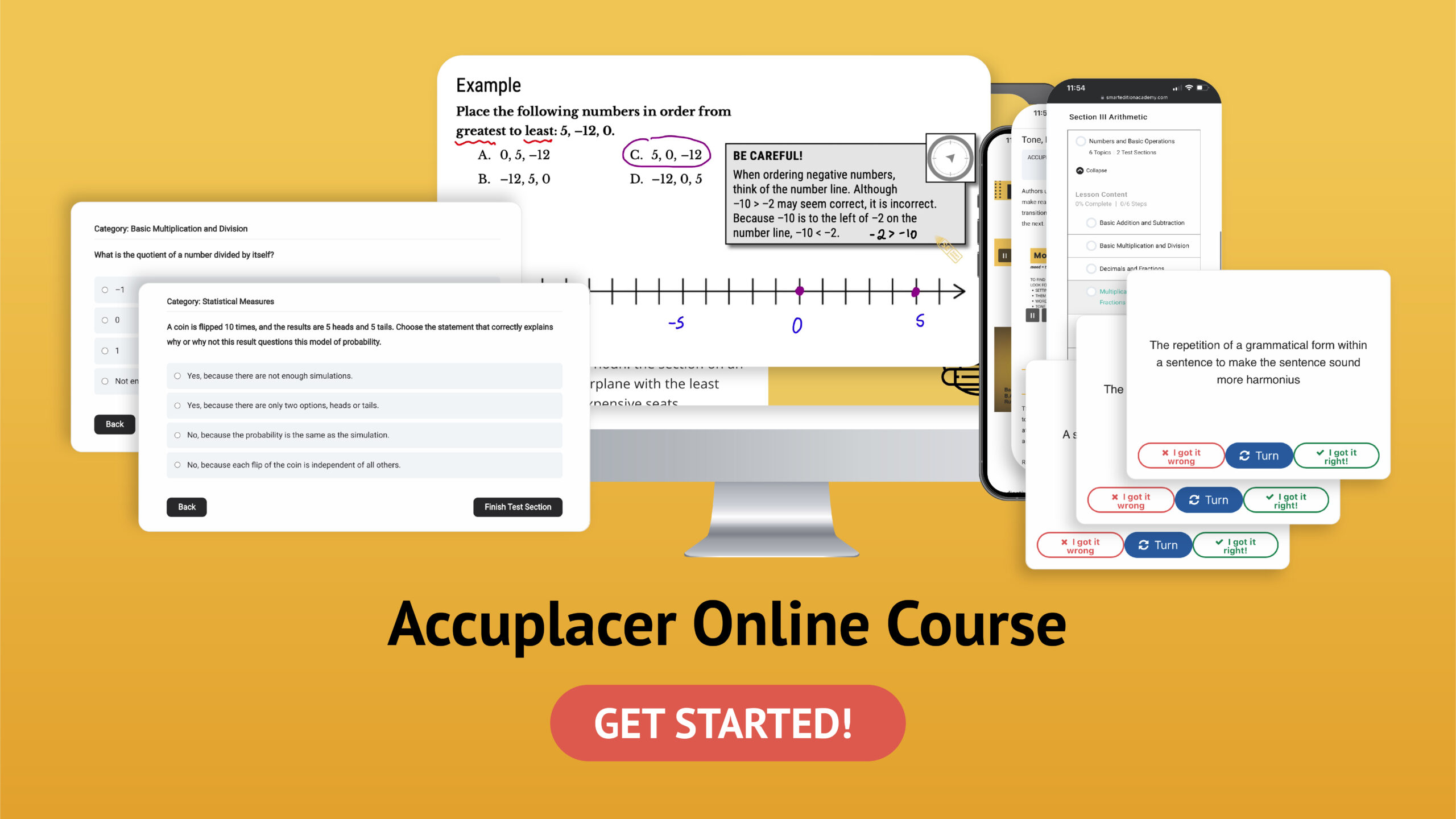ACCUPLACER Math Practice Test
Key Points:
- There are three sections of the ACCUPLACER that focus on math.
- Free math ACCUPLACER practice tests with answers and detailed explanations can help you study.
- Practice tests can reduce your study time and increase your scores.
- Smart Edition Academy has several options if you need more help.
- Start with a free ACCUPLACER practice test or prepare with an online course.
If you want more practice tests and all the resources to PASS the ACCUPLACER check out the Online Course
If you want the best chance at passing the ACCUPLACER then the Smart Edition ACCUPLACER course will provide all the material and resources you need to succeed on the test.
What kind of math is on the ACCUPLACER?
There are three sections of the ACCUPLACER that focus on math.
The first math section is called is the Arithmetic Placement Test which focuses on:
- Decimals operations
- Fractions operations
- Number comparisons and equivalents
- Percents
- Whole number operations
The second math section is called Quantitative Reasoning, Algebra, and Statistics Placement Test which focuses on:
- Algebraic Expressions
- Descriptive Statistics
- Exponents
- Geometry Concepts for Pre-Algebra
- Geometry Concepts for Algebra I
- Linear Applications and Graphs
- Linear Equations
- Probability and Sets
- Ratio and Proportional Relationships
- Rational numbers
The third ACCUPLACER math test section is called Advanced Algebra and Functions Placement Test which covers:
- Exponential and Logarithmic Equations
- Factoring
- Functions
- Geometry Concepts for Algebra I
- Geometry Concepts for Algebra II
- Linear Applications and Graphs
- Linear Equations
- Polynomial Equations
- Quadratics
- Radical and Rational Equations
- Trigonometry
While this may seem like a lot of material to prepare for it is mostly math you have learned in high school. With enough preparation and studying you should be able to master every topic on the ACCUPLACER test for math.
What is a good ACCUPLACER score for Math?
How many questions are on the Math ACCUPLACER
Each of the three ACCUPLACER math subtests contains 20 questions, here is a breakdown of the number of questions in each section and roughly how many questions per topic you can expect to see:
Arithmetic Placement Test – 20 questions
- Decimals operations: 3-5 questions
- Fractions operations: 3-5 questions
- Number comparisons and equivalents: 3-5 questions
- Percents: 3-5 questions
- Whole number operations: 3-5 questions
Quantitative Reasoning, Algebra, and Statistics Placement Test – 20 questions
- Algebraic Expressions (2-3 questions)
- Descriptive Statistics (1-3 questions)
- Exponents (2-3 questions)
- Geometry Concepts for Algebra I (1-2 questions)
- Geometry Concepts for Pre-Algebra (1-2 questions)
- Linear Applications and Graphs (2-4 questions)
Advanced Algebra and Functions Placement Test – 20 questions
- Exponential and Logarithmic Equations (1-3 questions)
- Factoring (1-2 questions)
- Functions (2-4 questions)
- Geometry Concepts for Algebra I (1-2 questions)
- Geometry Concepts for Algebra II (1-2 questions)
- Linear Applications and Graphs (2-3 questions)
- Linear Equations (2-3 questions)
- Polynomial Equations (1-3 questions)
- Quadratics (2-3 questions)
- Radical and Rational Equations (1-3 questions)
- Trigonometry (1-3 questions)
Can you take the ACCUPLACER test online at home?
The ACCUPLACER test is not available to be taken remotely from a home or non-testing location.
Test takers are only allowed to take the ACCUPLACER in person at approved testing facilities.
Students are able to schedule their ACCUPLACER testing with their desired program or seek out a convenient testing facility by going to the official ACCUPLACER website.
How to study for the math ACCUPLACER?
The best way to study for the ACCUPLACER math section is to take a lot of practice tests and practice solving as many math problems as possible.
Studying math comes down to repetition and active practice. It’s best to start with studying with math practice tests to determine how well you’re doing on each topic. It’s easier to create a realistic study plan to boost your ACCUPLACER score when you can pinpoint exactly what areas you need to improve.
For example, you may determine that you answer questions about ratios and percentages correctly, but it’s conversion and linear equations that have you stumped. ACCUPLACER study sessions should focus on one topic at a time for 45-60 minutes a few times a week. Use a reliable study guide such as the ACCUPLACER Online Course from Smart Edition to review the math videos, math chapters, and follow up by answering questions in the question banks to actively practice what you’ve studied.
Can I use a calculator on ACCUPLACER?
Test takers can use a calculator on the ACCUPLACER, however, students are not allowed to use their own calculator. Calculators are provided to test takers on the computer when taking their test, no physical calculators are allowed.
Need additional help studying for the ACCUPLACER test?
Be sure to check out all of our free ACCUPLACER practice tests and be prepared for all of the different test sections. You can get practice with reading comprehension using a free online ACCUPLACER reading practice test.
ACCUPLACER Online Course
If you want the best chance for scoring high then the Smart Edition ACCUPLACER course will provide all the material and resources you need to succeed on the test.


